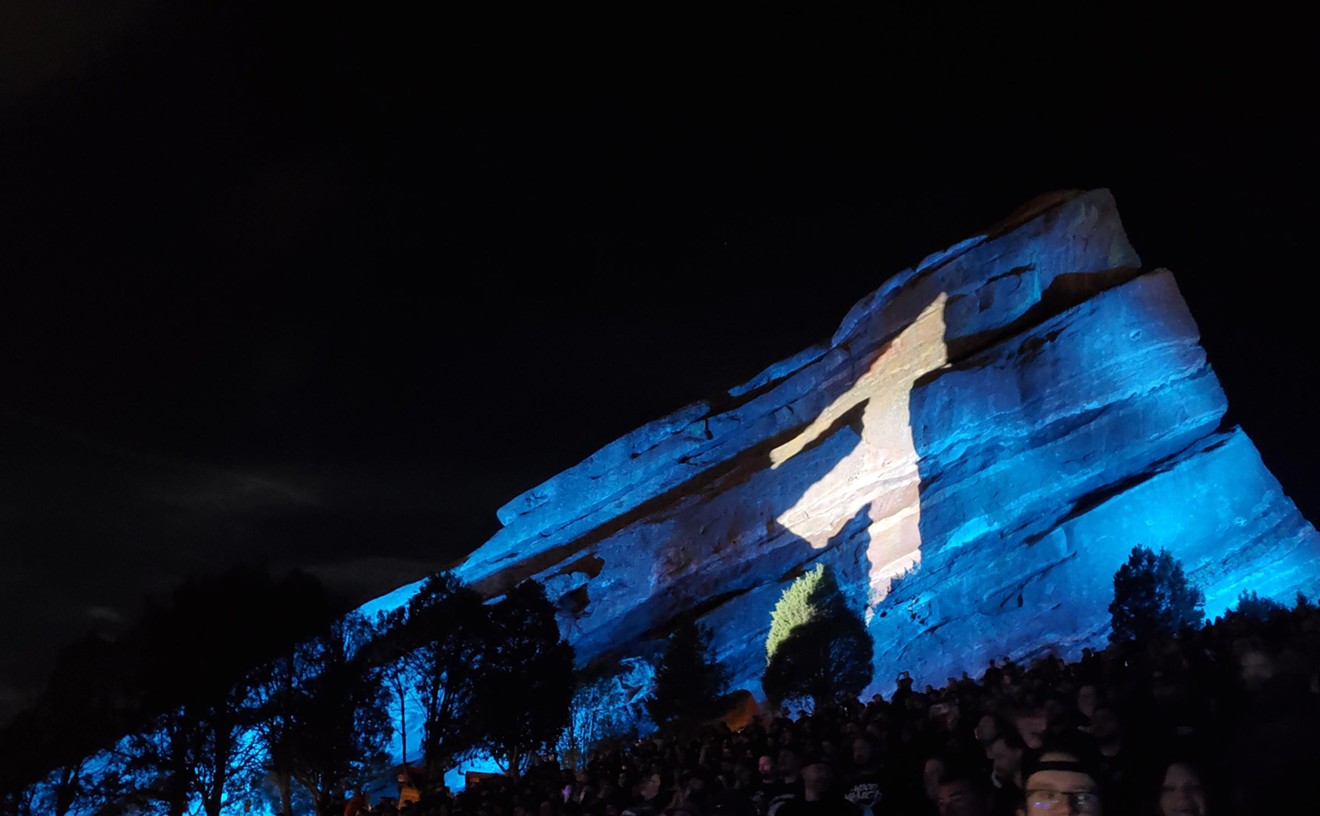The lawsuit, filed December 2, lists six plaintiffs who are being represented by a coalition of disability-rights organizations, including the Civil Rights Education and Enforcement Center (CREEC), the Colorado Cross-Disability Coalition (CCDC) and Disability Law Colorado (DLC).
One of the plaintiffs in the lawsuit is Kalyn Heffernan, the well-known MC of the hip-hop group Wheelchair Sports Camp and the 2015 recipient of Westword’s MasterMind award.
Following the suit's filing, Heffernan spoke with Westword to explain the reasoning behind some of the suit’s discrimination claims, as well as to underscore their importance by relating her own experiences going to see shows at Red Rocks in her wheelchair.
The first thing to understand, Heffernan says, is that the amphitheater only has two rows that are available to wheelchair users: the very first row and the very last row (row seventy). Obviously, it’s not as much fun to pay for a full-priced ticket and have to sit at the very back of Red Rocks behind thousands of fans, so Heffernan always tries to get a front-row seat.
But getting those coveted row-one tickets has become exceedingly difficult, Heffernan explains, especially as many get swiped up the moment they go on sale by ticket scalpers, who in turn sell the tickets for a considerable markup on the secondary market. This means that wheelchair users are often forced to pay hundreds of dollars more to see a concert unless they want to sit in row seventy. According to Heffernan and the other plaintiffs, concert promoters also reserve some front-row spots for themselves to give out to friends, artists and business associates – spots that aren’t necessarily always filled and could instead be offered up to wheelchair users the night of a concert. But the lawsuit alleges that rarely happens.
Heffernan’s frustration with Red Rocks is best encapsulated by an experience she had when attending a Flying Lotus, Schoolboy Q and Nas concert on June 19, 2014. The events of that night eventually led her to file a Civil Rights Discrimination claim with the State of Colorado. (Heffernan’s full claim can be viewed at the bottom of this article.)
“It was the worst experience I ever had,” recalls Heffernan, who estimates that she has attended between one and five Red Rocks shows per season since 1997.
On the night of the Nas and FlyLo concert, Heffernan had not pre-bought a ticket, so she went to the box office to ask if they had seats available for wheelchair users. She was told that the show’s independent promoter had neglected to set any aside.
So Heffernan did what she had done many times over the years: she bought a general-admission ticket with the expectation that attendants at the amphitheater would, at the very least, allow her to sit off to the side of the front-row bench.
She quickly ran into problems, though, starting with the venue’s shuttle bus, which Red Rocks provides to transport patrons from the parking lots to various entrances. When it was Heffernan’s turn to board a shuttle, the driver refused to take her to the lower entrance (servicing the front row) because she didn’t have a row-one ticket.
She asked the driver how many people in wheelchairs had been given rides that day.
“You’re the first," the driver responded. Then the driver denied her second request for a ride.
Heffernan eventually convinced the driver to give her a ride (“Don’t tell anyone,” the driver pleaded, apparently fearful of disobeying his superiors).
Heffernan says that since 2014, she and other wheelchair users have frequently been denied shuttle rides to the lower entrance if they don’t have a front-row ticket on them, even though it is one of only two areas in the entire venue where they're told they can sit. The lawsuit filed against Denver includes these claims:
After going through the whole shuttle ordeal, Heffernan’s woes at the FlyLo concert were not over – even though the entire amphitheater, including the front row, was undersold.
“It was the weirdest Red Rocks show, where [the venue] was only a quarter full," she remembers.
But an attendant at the front row denied her access and told her to board the shuttle heading for the seventieth row.
“You’re telling me that you want me to sit all the way up there behind all of these empty seats?" Heffernan asked skeptically. “No, I’m not leaving,” she added. “You’ll have to either arrest me or carry me."
Five supervisors later, “I was crying because I was so frustrated," remembers Heffernan.
She characterizes the situation that night – given the near-empty first row – as being irrational and stressful. In the end, Red Rocks supervisors finally decided that Heffernan could be lifted in her wheelchair to one of the planters located on the sides of the amphitheater.
“I’d be happy to go to row seventy if row one was filled with people who needed it,” Heffernan stresses. “But it’s never been that way."
Since that concert in 2014, Heffernan has experienced the same problems at other shows, including being denied shuttle service to the front row.
Now, when she's not lucky enough to score a rare front-row ticket to a concert, she goes with friends who help push her up the steep ramp to the lower entrance, then lift her wheelchair and carry her up a number of steps until they can find space for her in one of the planters.
For the most part, Heffernan does not blame the employees who work at Red Rocks. “Most of the staff wants to accommodate me,” she says. “It’s just that the higher-ups are threatening their jobs."
According to the legal team that filed the lawsuit against Denver, the city has refused to address concerns raised by the plaintiffs or settle outside of court.
Brian Kitts of Denver Arts & Venues, the city department that oversees Red Rocks, couldn't address the case specifically and instead provided Westword with the following statement:
Heffernan says she hopes the lawsuit will solve unfair practices at one of her favorite concert venues and raise awareness of the discrimination that she and other wheelchair users regularly experience.
Denver Arts & Venues has a long history of working with a number of communities to improve the patron experience for all, including complying with the Americans With Disabilities Act. We continually monitor feedback and update venue operations in order to make all of our facilities, including Red Rocks Amphitheatre, comfortable, safe and accessible to all patrons. We will continue to work with groups representing disabled communities, in order to improve the experience of patrons with disabilities to the extent we are allowed by law, including the ADA, and the unique characteristics of venues like Red Rocks Amphitheater.
“Us disabled people spend the same amount of money to go to these shows, and our experience is not equally enjoyable," she says.
Below, you can read Heffernan's Civil Rights Complaint, which was filed before she joined the class of plaintiffs named in the current lawsuit:
Civil Rights Claim - Red Rocks











